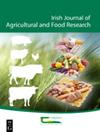提高新鲜红肉质量的最新研究和新兴工具
IF 1.4
4区 农林科学
Q3 AGRICULTURE, MULTIDISCIPLINARY
引用次数: 12
摘要
消费者购买红肉的决定受到许多相互作用因素的综合影响,包括安全性、营养、可持续性和对健康的看法,以及各种感官特征,如颜色、大理石花纹、嫩度、多汁性和风味。红肉的品质是复杂的,受到许多内在和外在因素的影响,从品种/遗传到最终产品,主要影响因素来自农场管理和死后加工。由于各种因素的影响,包括消费者的需求,红肉质量和安全的重要性近年来已经成为肉类行业的重要问题,满足这些要求的步骤对盈利能力有很大的影响。因此,对有助于控制这些特征的步骤进行批判性审查是非常重要的。在此基础上,从研究和工业层面提出了提高鲜红肉品质性状的几种加工策略。本文综述了目前用于提高鲜肉质量和安全的方法,包括胴体管理和预测工具以及技术和感官品质性状的进展。这些方法也与尸体和肉类的安全性和微生物状况有关,以及最近感官分析的发展,旨在了解红肉的感官特性和消费者的反应。在基因组学、蛋白质组学和代谢组学的主题下,讨论了食物组学方法的潜力,这有助于我们理解感官和技术质量性状变化背后的潜在生物学机制,以及它们在发现假定的生物标志物方面的应用。我们进一步考虑了当前和新兴的基于测序的方法,用于了解新鲜红肉的微生物群落组成。本文章由计算机程序翻译,如有差异,请以英文原文为准。
Current research and emerging tools to improve fresh red meat quality
A consumer’s decision to purchase red meat is guided by a combination of many interacting factors including safety, nutrition, sustainability and perception of healthiness along with a variety of sensory characteristics such as colour, marbling, tenderness, juiciness and flavour. Red meat quality is complex and influenced by many intrinsic and extrinsic factors, spanning the chain from breed/genetics through to the final end product with key influences coming from on-farm management and post-mortem processing. As a result of various factors, including consumer demands, the importance of both red meat quality and safety has in recent times come to the fore for the meat industry, with steps to meet these requirements having a large bearing on profitability. Therefore, a critical review of steps which can help control these traits is very important. Accordingly, several processing strategies were proposed at the research and industry level aiming to improve fresh red meat quality traits. This review summarises the current methods applied to improve fresh red meat quality and safety, including the advances in management and prediction tools for carcass and technological and sensory quality traits. These methods are also relevant to the safety and microbiological status of carcasses and meat produced, along with the recent developments in sensory analysis, which aim to understand the sensory properties of red meat and consumers responses. The potential of foodomics approaches is discussed under the topics of genomics, proteomics and metabolomics, which help our understanding of the underlying biological mechanisms behind the variation of sensory and technological quality traits and their use for the discovery of putative biomarkers. We further considered the current and emerging sequencing-based methods used to understand microbial community composition of fresh red meat.
求助全文
通过发布文献求助,成功后即可免费获取论文全文。
去求助
来源期刊
CiteScore
2.50
自引率
20.00%
发文量
23
审稿时长
>36 weeks
期刊介绍:
The Irish Journal of Agricultural and Food Research is a peer reviewed open access scientific journal published by Teagasc (Agriculture and Food Development Authority, Ireland). Manuscripts on any aspect of research of direct relevance to Irish agriculture and food production, including plant and animal sciences, food science, agri environmental science, soils, engineering, buildings, economics and sociology, will be considered for publication. The work must demonstrate novelty and relevance to the field of research. Papers published or offered for publication elsewhere will not be considered, but the publication of an abstract does not preclude the publication of the full paper in this journal.

 求助内容:
求助内容: 应助结果提醒方式:
应助结果提醒方式:


